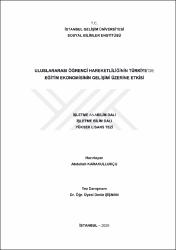| dc.contributor.author | Karakullukçu, Abdullah | |
| dc.date.accessioned | 2020-06-21T21:14:55Z | |
| dc.date.available | 2020-06-21T21:14:55Z | |
| dc.date.issued | 2020 | en_US |
| dc.date.submitted | 2020-02-20 | |
| dc.identifier.uri | https://hdl.handle.net/11363/2241 | |
| dc.description | Danışman: DR. ÖĞR. ÜYESİ DENİZ ŞİŞMAN
Yer Bilgisi: İstanbul Gelişim Üniversitesi / Sosyal Bilimler Enstitüsü / İşletme Anabilim Dalı / İşletme Bilim Dalı
Konu: İşletme = Business Administration | en_US |
| dc.description.abstract | Eğitim, ulusların devamlılığı ve gelişimi için varlığı yadsınamazken küresel çapta genel geçer kabul görmüş bir gerçektir. Ülkeler gelişmişlik düzeyleri dolayısı ile teknoloji benzeri birçok faktörle eğitim sistemlerinde farklı politikalar uygulamaktadır. Bu noktada küresel arenada ülkeler eğitimin ekonomilerine ve tabi olgusu gelişmişlikleriyle refahlarını arttırdığı kanısında hemfikir olmuşlardır. Türkiye'de eğitim ve mesleki gelişim amacıyla ülkesini terk eden uluslararası öğrencileri eğitim sistemine dâhil etmek için çeşitli politikalar uygulamaktadır. Bu çalışma uluslararası öğrenci hareketliliğinin Türkiye ekonomisine katkısını tespit etmeyi hedeflemiştir. Bu amaçla çalışma İstanbul'da 400 uluslararası öğrencinin oluşturduğu örnekleminde yabancı öğrenci temasında bütçe değişkeni çerçevesinde öğrencilerin Türkiye'de kalma ve Türkiye'yi tavsiye etme eğilimlerini araştırmıştır. Araştırmada 500-3000 TL aralığı bütçeleri olan yabancı öğrencilerin, lise eğitimi için Türkiye'yi tercih etmedikleri, lisansüstü eğitimler için ise olası potansiyel gözlenmiştir. Yaygın olarak lisans eğitimi için Türkiye'nin tercih edildiği saptanmıştır. Tüm bütçe gruplarında da nispi üstünlüğün yurtdışı eğitim için Türkiye'yi tavsiye etme yönünde olduğu görülmüştür. Fakat 400 uluslararası öğrenci örnekleminden Türkiye'yi yabancı öğrenci hareketliliği için öneren 262öğrenci %65,5'lik bir oran, Türkiye'yi yabancı öğrenci hareketliliği için önermeyen 138'i yaklaşık olarak %34,5'lik oran göz ardı edilebilecek bir rakam değildir. Bütçeyle ilişkili olmayan bu tutumlarının ardındaki sebeplerin irdelenmesi ise başka bir çalışmanın gerekliliğine işaret etmektedir. Yabancı öğrencinin Türkiye'de kalma durumu özellikle yüksek gelire sahip olanları söz konusu olduğunda bütçeden daha farklı değişkenlerle ilişkili olduğu öngörüsünde bulunulabilir. Gelir durumları daha yüksek olan yabancı öğrencilerin Türkiye'de kalma eğiliminde olduğu görüşüne varılabileceği gibi aylık kazancı 500-2000 lira aralığında olan yabancı öğrencilerin Türkiye'de ihtiyaçlarını uzun vadede karşılayamadıkları böylece Türkiye'de kalmayı tercih etmedikleri öngörüsünde de bulunulabilir. Öğrencilerin bütçeleriyle ancak ihtiyaçlarını karşılayabildiği böylece tutumlu olma eğilimi gösterdikleri öngörüsüne ulaşılmıştır. Gelir durumu az olan (bu çalışma için 500-2000 Aralığı) uluslararası öğrencilerin Türkiye'yi pahalı kabul ettikleri görülmüştür. Ayrıca 1000-2000 lira gelire sahip yabancı öğrencinin Türkiye ekonomisini pahalı bulması eğitim için ayrılan bütçenin yeterlilik hususuyla çeliştiği kanısına varılabilir. | en_US |
| dc.description.abstract | While education cannot be denied its existence for the continuity and development of nations, it is a globally accepted fact. Countries implement different policies in their education systems with many technology-like factors due to their level of development. As mentioned earlier, the phenomenon of universal real education will be able to achieve its goals once it achieves global prevalence. At this point, countries in the global arena agreed that education increased their economies and, of course, their well-being and their well-being. It implements various policies to include international students leaving their country for education and professional development in Turkey. This study aims to determine the contribution of international student mobility to the Turkish economy. For this purpose, the study investigated the tendency of students to stay in Turkey and recommend Turkey within the framework of the budget variable in foreign student contact in the sample of 400 international students in Istanbul. In the study, foreign students with a range of 500-3000 TL did not prefer Turkey for high school education and the potential potential for postgraduate education was observed. It has been found that Turkey is preferred for undergraduate education. In all budget groups, it has been seen that the relative advantage is to recommend Turkey for study abroad. However, the 34.5% who do not recommend Turkey for foreign student mobility are not ignored and the reasons behind these attitudes, which are not related to the budget, indicate the necessity of another study. The foreign student's status in Turkey can be predicted to be related to different variables than the budget, especially when it comes to those with high incomes. It can be seen that foreign students with higher income status tend to stay in Turkey, as well as foreign students with monthly earnings in the range of 500-2000 lira in Turkey can not meet their needs in the long term so that they can not meet It can also be predicted that they do not choose to stay in Turkey. It is predicted that students are only able to meet their needs with their budgets and thus tend to be frugal. International students with low income status (500-2000 range for this study) have been found to consider Turkey expensive. In addition, it can be concluded that the budget allocated for education contradicts the issue of competence if a foreign student with an income of 1000-2000 lira finds the Turkish economy expensive. | en_US |
| dc.language.iso | tur | en_US |
| dc.publisher | İstanbul Gelişim Üniversitesi Sosyal Bilimler Enstitüsü | en_US |
| dc.rights | info:eu-repo/semantics/openAccess | en_US |
| dc.rights | Attribution-NonCommercial-NoDerivs 3.0 United States | * |
| dc.rights.uri | http://creativecommons.org/licenses/by-nc-nd/3.0/us/ | * |
| dc.subject | Uluslararası Öğrenci Hareketliliği | en_US |
| dc.subject | Yabancı Öğrenci | en_US |
| dc.subject | Türkiye Ekonomisi | en_US |
| dc.subject | International Student Mobility | en_US |
| dc.subject | Foreign Student | en_US |
| dc.subject | Turkish Economy | en_US |
| dc.title | Uluslararası öğrenci hareketliliğinin Türkiye'de eğitim ekonomisinin gelişimi üzerine etkisi | en_US |
| dc.title.alternative | Development of education economy effects of international student mobility in Turkey | en_US |
| dc.type | masterThesis | en_US |
| dc.department | Sosyal Bilimler Enstitüsü | en_US |
| dc.relation.publicationcategory | Tez | en_US |



















